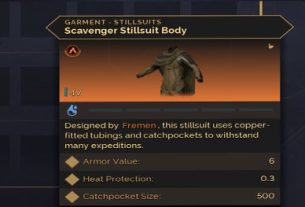Progression in Dune: Awakening is not just about leveling up or acquiring powerful gear; it’s a holistic system that combines character growth, skill mastery, and player expertise. The game features a well-balanced progression system where 33% of player advancement is determined by gear, another 33% by skills, and the remaining 33% by the player’s ability to effectively use their chosen build and adapt to various situations. Here’s a comprehensive look at how progression works in Dune: Awakening.
A Balanced Progression System
The key to progression in Dune: Awakening is the balance between three main factors: gear, skills, and player skill. This design ensures that no single aspect dominates the player’s advancement, allowing for a more nuanced and engaging progression experience. Players will need to focus on leveling up, acquiring better gear, and mastering skills while refining their combat strategies to thrive in the world of Arrakis.
Gaining Experience and Leveling Up
Players gain experience through a variety of activities, including combat, crafting, exploration, and quests. As they level up, they unlock two important resources that shape their development:
- Intel Points: These points are used to unlock new technologies in the game’s technology tree, offering players new tools and abilities to enhance their gameplay. Intel Points can be obtained through exploration, such as raiding enemy bases for their Intel or completing specific tasks.
- Ability Points: These points are used for training and upgrading skills within specific archetypes or “classes” and can only be obtained by leveling up. Ability Points are crucial for honing combat techniques and other abilities that define a player’s playstyle.
Skills, Abilities, and Techniques
As players progress, they enhance their characters through a combination of active and passive skills, techniques, and crafting. This allows players to tailor their abilities and strategies to suit their preferred playstyle.
- Passive Skills: These provide continuous, passive benefits to the player’s stats and abilities, enhancing combat effectiveness and other aspects of gameplay over time.
- Active Abilities: These abilities are triggered by pressing a button and can have a wide variety of effects, such as activating the Voice or using a Sugar Wire Claw grappling hook. Players can equip up to three active abilities at a time, making it important to choose abilities that complement their preferred combat style.
- Techniques: These are special abilities that must be equipped and provide situational bonuses, such as increasing headshot damage. Players can equip up to three techniques, further customizing their character’s capabilities.
Crafting and Customization
Crafting is another key component of progression, allowing players to create a wide range of items, including weapons, armor, tools, and consumables. Players can craft using both regular and unique schematics. Regular schematics can be used multiple times to create items, while unique schematics enable the creation of powerful, one-of-a-kind items. Crafting provides players with the tools to enhance their gear and gain a competitive edge in combat or other challenges.
Archetypes: Choose Your Path
The game offers a selection of archetypes, or “classes,” that are inspired by the rich lore of the Dune universe. These archetypes represent the player’s background and initial training and determine their starting abilities and talent tree. Some examples include:
- Benny Gesserit: A class focused on manipulation, stealth, and enhancing mental abilities.
- Swordmaster: A warrior class specializing in close combat and martial prowess.
- Trooper: A heavily armored, combat-focused class with strong survival skills.
- Mentat: A class with a focus on intelligence, strategy, and tactical thinking.
Each archetype starts with specific abilities and a talent tree, but Dune: Awakening doesn’t lock players into a single path. Through exploration, players can find trainers in the world who will offer training in other archetypes. This allows players to learn new skills and expand their abilities, opening the door for hybrid builds and experimentation with different playstyles.
Flexibility and Hybrid Builds
The flexibility of the progression system is one of its most exciting features. While players begin with an archetype of their choice, they can eventually master all archetypes and skill trees, provided they are willing to invest significant time and effort—estimated at around 500 hours. This allows for an unprecedented level of customization, letting players experiment with different builds and strategies. Whether you want to be a master of one archetype or blend skills from several to create a unique hybrid build, Dune: Awakening gives you the tools to craft your ideal character.
Mastering Combat and Other Activities
Player skill plays a critical role in progression. While leveling up, acquiring gear, and upgrading skills are important, the player’s ability to effectively use their character’s build in combat and other activities is just as crucial. The dynamic nature of combat, exploration, and crafting means that players must adapt to different situations, making skillful decision-making and quick reflexes essential for success.
Conclusion
Dune: Awakening offers a progression system that is rich, dynamic, and deeply integrated with the game’s core mechanics. By balancing gear, skills, and player skill, the game ensures that players remain engaged in their journey of growth and mastery. Whether you’re raiding enemy bases for Intel, crafting powerful gear, or training in multiple archetypes, the progression system offers plenty of room for customization and experimentation. With a combination of active and passive skills, techniques, and hybrid builds, players can truly shape their own destiny on the sands of Arrakis.



